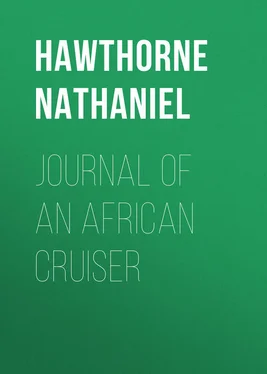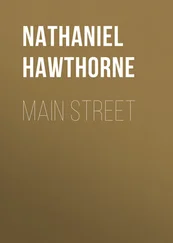Nathaniel Hawthorne - Journal of an African Cruiser
Здесь есть возможность читать онлайн «Nathaniel Hawthorne - Journal of an African Cruiser» — ознакомительный отрывок электронной книги совершенно бесплатно, а после прочтения отрывка купить полную версию. В некоторых случаях можно слушать аудио, скачать через торрент в формате fb2 и присутствует краткое содержание. Жанр: literature_19, foreign_antique, foreign_prose, на английском языке. Описание произведения, (предисловие) а так же отзывы посетителей доступны на портале библиотеки ЛибКат.
- Название:Journal of an African Cruiser
- Автор:
- Жанр:
- Год:неизвестен
- ISBN:нет данных
- Рейтинг книги:5 / 5. Голосов: 1
-
Избранное:Добавить в избранное
- Отзывы:
-
Ваша оценка:
- 100
- 1
- 2
- 3
- 4
- 5
Journal of an African Cruiser: краткое содержание, описание и аннотация
Предлагаем к чтению аннотацию, описание, краткое содержание или предисловие (зависит от того, что написал сам автор книги «Journal of an African Cruiser»). Если вы не нашли необходимую информацию о книге — напишите в комментариях, мы постараемся отыскать её.
Journal of an African Cruiser — читать онлайн ознакомительный отрывок
Ниже представлен текст книги, разбитый по страницам. Система сохранения места последней прочитанной страницы, позволяет с удобством читать онлайн бесплатно книгу «Journal of an African Cruiser», без необходимости каждый раз заново искать на чём Вы остановились. Поставьте закладку, и сможете в любой момент перейти на страницу, на которой закончили чтение.
Интервал:
Закладка:
The poorer classes in the vicinity are nearly all colored, and mostly free. They work for eight or ten cents a day, living principally on fruit and vegetables, and are generally independent, because their few wants are limited to the supply. The richest persons live principally within themselves, and derive their meats, vegetables, fruits, wine, brandy, sugar, coffee, oil, and most other necessaries and luxuries, from their own plantations. One piece of furniture, however, to be seen in several of the houses, was evidently not the manufacture of the island, but an export of Yankee-land. It was the wooden clock, in its shining mahogany case, adorned with bright red and yellow pictures of Saints and the Virgin, to suit the taste of good Catholics. It might have been fancied that the renowned Sam Slick, having glutted all other markets with his wares, had made a voyage to St. Antonio. Nor did they lack a proper artist to keep the machine in order. We met here a person whom we at first mistook for a native, so identical were his manners and appearance with those of the inhabitants; until, in conversation, we found him to be a Yankee, who had run away from a whale-ship, and established himself as a clock and watch-maker.
After a good night's rest, another officer and myself left Paolo, early, for a mountain ride. The little pilot led the way on a donkey; my friend followed on a mule, and I brought up the rear on horseback. We began to ascend, winding along the rocky path, one by one, there being no room to ride two abreast. The road had been cut with much labor, and, in some places, was hollowed out of the side of the cliff, thus forming a gallery of barely such height and width as to admit the passage of a single horseman, and with a low wall of loose stones between the path and the precipice. At other points, causeways of small stones and earth had been built up, perhaps twenty feet high, along the top of which ran the path. On looking at these places from some projecting point, it made us shudder to think that we had just passed, where the loosening of a single one of those small stones might have carried us down hundreds of feet, to certain destruction. The whole of the way was rude and barren. Here and there a few shrubs grew in the crevices of the rocks, or wild flowers, of an aspect strange to our eyes, wasted their beauty in solitude; and the small orchilla weed spread itself moss-like over the face of the cliff. At one remarkable point, the path ran along the side of the precipice, about midway of its height. Above, the rock rose frowningly, at least five hundred feet over our heads. Below, it fell perpendicularly down to the beach. The roar of the sea did not reach us, at our dizzy height, and the heavy surf-waves, in which no boat could live, seemed to kiss the shore as gently as the ripple of a summer-lake. This was the most elevated point of the road, which thence began to descend; but the downward track was as steep and far more dangerous. At times, the animals actually slid down upon their haunches. In other places, they stept from stone to stone, down steep descents, where the riders were obliged to lie backwards flat upon the cruppers.
Over all these difficulties, our guide urged his donkey gaily and unconcernedly. As for myself, though I have seen plenty of rough riding, and am as ready as most men to follow, if not to lead, I thought it no shame to dismount more than once. The rolling of a stone, or the parting of stirrup, girth, or crupper, would have involved the safety of one's neck. Nor did the very common sight of wooden crosses along the path, indicating sudden death by accident or crime, tend to lessen the sense of insecurity. The frequent casualties among these precipitous paths, together with the healthfulness of the climate, have made it a proverb, that it is a natural death, at St. Antonio, to be dashed to pieces on the rocks. But such was not our fate. We at length reached the sea-shore, and rode for a mile along the beach to the city of Poverson, before entering which metropolis, it was necessary to cross a space of level, sandy ground, about two hundred yards in extent. Here the little pilot suddenly stuck his heels into the sides of his donkey, and dashed onward at a killing pace; while mule and horse followed hard upon his track, to the great admiration of ragamuffins, who had assembled to witness the entrée of the distinguished party.
Poverson is the capital of the island, and contains about two thousand inhabitants, who, with few exceptions, are people of color. The streets are crooked and narrow, and the houses mean. We called upon the military and civil Governors, and, after accepting an invitation to dine with the former, left the place for a further expedition. Passing over a shallow river, in which a number of women and girls were washing clothes, we ascended a hill so steep as to oblige us to dismount, and from the summit of which we had a fine view of the rich valley beneath. It is by far the most extensive tract of cultivated land that we have seen in the island, and is improved to its utmost capacity. We thence rode three miles over a path of the same description as before, and arrived at the village and port of Point-de-Sol. The land about this little town is utterly barren, and the inhabitants are dependent on Poverson for food, with the exception of fish. A custom-house, a single store, a church, and some twenty houses of fishermen, comprise all the notable characteristics of the principal seaport of the island.
It was a part of our duty to make an examination of the harbor, for which purpose we needed a boat. Two were hauled up on the beach; but the smallest would have required the power of a dozen men to launch her; – whereas, the fishermen being absent in their vocation, our party of three, and a big boy at the store, comprised our whole available masculine strength. The aid of woman, however, is seldom sought in vain; nor did it fail us now. Old and young, matron and maid, they all sallied forth to lend a hand, and, with such laughing and screaming as is apt to attend feminine efforts, enabled us to launch the boat. In spite of their patois of bad Portuguese, we contrived to establish a mutual understanding. A fine, tall girl, with a complexion of deep olive, clear, large eyes, and teeth beautifully white and even, stood by my side; and, like the Ancient Mariner and his sister's son, we pulled together. She was strong, and, as Byron says, "lovely in her strength." This difficulty surmounted, we rowed round the harbor, made our examination, and returned to the beach, where we again received the voluntary assistance of the women, in dragging the boat beyond the reach of the waves. We now adjourned to the store, in order to requite their kindness by a pecuniary offering. Each of our fair friends received two large copper coins, together equal to nine cents, and were perfectly satisfied, as well they might be – for it was the price of a day's work. Two or three individuals, moreover, "turned double corners," and were paid twice; and it is my private belief that the tall beauty received her two coppers three times over.
After a lunch of fried plantains and eggs, we rode back to Poverson. On the way, we met several persons of both sexes with burdens on their heads, and noticed that our guide frequently accosted them with a request for a pinch of snuff. With few exceptions, a horn or piece of bone was produced, containing a fine yellow snuff of home-manufacture, which, instead of being taken between the thumb and finger, was poured into the palm of the hand, and thence conveyed to the nose. Arriving at the city, we proceeded at once to the house of the Commandant, and in a little time were seated at dinner.
Our host was fitted by nature to adorn a far more brilliant position than that which he occupied, as the petty commander of a few colored soldiers, in a little island of the torrid zone. He was slightly made, but perfectly proportioned, with a face of rare beauty, and an expression at once noble and pleasing. His eyes were large, and full of a dark light; his black hair and moustache were trimmed with a care that showed him not insensible of his personal advantages; as did likewise his braided jacket, fitting so closely as to set off his fine figure to the best effect. His manners were in a high degree polished and graceful. One of the guests, whom he had invited to meet us, understood English; and the conversation was sustained in that language, and in Spanish. The dinner was cooked and served in the Portuguese style; it went off very pleasantly, and was quite as good as could be expected at the house of a bachelor, in a place so seldom visited by strangers. Each of the Portuguese gentlemen gave a sentiment, prefaced by a short complimentary speech; and our party, of course, reciprocated in little speeches of the same nature. The Commandant did not fail to express the gratitude due from the people of the Cape de Verd islands to America, for assistance in the hour of need. Time did not permit us to remain long at table, and we took leave, highly delighted with our entertainment.
Читать дальшеИнтервал:
Закладка:
Похожие книги на «Journal of an African Cruiser»
Представляем Вашему вниманию похожие книги на «Journal of an African Cruiser» списком для выбора. Мы отобрали схожую по названию и смыслу литературу в надежде предоставить читателям больше вариантов отыскать новые, интересные, ещё непрочитанные произведения.
Обсуждение, отзывы о книге «Journal of an African Cruiser» и просто собственные мнения читателей. Оставьте ваши комментарии, напишите, что Вы думаете о произведении, его смысле или главных героях. Укажите что конкретно понравилось, а что нет, и почему Вы так считаете.












